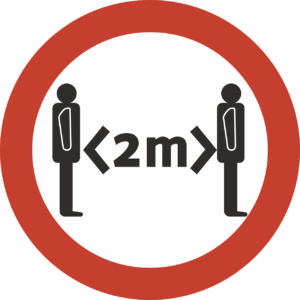Thanks to Covid-19, almost every business in Ireland has been undergoing some significant changes to its operations. At first the schools closed, then it was the pubs, restaurants and cultural institutions. Then came the latest restrictions which stated that all businesses that cannot offer remote working must close for business, unless they are employed to fulfil an essential service. This has unfortunately meant layoffs and redundancies for a lot of businesses, and a quick scramble to accommodate home working for others.
While a lot of HR content recently has been focused on advice for coping with both these issues, it seems that there has been less advice offered for those businesses that must remain operational. Yet it is more important than ever that these employees are being supported. If your organisation offers what is deemed as an essential service, then your employees likely have mixed feelings about still being required to physically go to work. While they witness the rest of the business world close their doors to the public to stop the spread of Covid-19, they must continue to travel to and from the workplace in order to fulfil the duties of their role.
Implications for employees physically attending work
Employees who continue to offer an essential service have likely seen their job description changing somewhat, with unprecedented measures and restrictions now being imposed upon them. These measures – such as social distancing and wearing protective clothing – likely impede upon their ability to do their work with ease.
Another aspect to consider is how this is affecting the mental well-being of your employees. This is the first time in recent history that there has been such a unanimous, restrictive and global response to a pandemic. This fact, coupled with the varying levels of panic communicated by the media, is causing widespread fear and worry. Many of the workers on the front-line – and by ‘front-line’ we mean all those providing essential services – will be worried about the implications for their own health and that of their families. Some workers are even being isolated from their children as a precautionary measure. It must be hard for these workers to see other families being able to spend more time than ever with their children, while they put themselves at risk for the benefit of the nation.
Employers are therefore walking an increasingly tricky tightrope between providing essential service while still providing a duty of care to their employees. Employers in this position must give special consideration to a number of different areas.
Making space
Employees providing an essential service, from nurses through to supermarket workers, are likely experiencing increased levels of stress as they deal with equally stressed members of the public. Having a respite from the busy work-space is therefore essential. If your workplace has a common area for employees, you should ensure that it is only used if there is enough space in there for people to practice safe distancing. Alternatively, you must communicate to employees that only a certain number of people must be in there at any time. However, having smaller makeshift spaces for individual employees to have some alone and take a breather is a great way of giving your employee private space without compromising governmental guidelines.

Having a space in the workplace for employees to take a breather and stretch is a good idea
Practicing meditation and mindfulness can also help to alleviate some of this stress. There are many apps on the market these days that employees can download for free. The paid versions are also quite affordable, so you could consider paying for plans for employees as a way of showing appreciation for their work during this time.
Here are three of our favourites:
- Headspace offers ten days’ worth of mindfulness meditations free of charge to all users. Users can then either choose to upgrade to the paid version (Currently €58 per year, or €12.99 per month)
- Calm is probably a little more varied than Headspace and delivers daily meditation to users who sign up for the paid plan. However, there is also a free version of the plan with a limited number of meditations. It also comes with bedtime stories and breathing exercises. Prices vary but are in the same range as the plans offered by Headspace.
- The Waking Up App’s USP is that it goes one step further than other mindfulness and meditation apps by encouraging users to discover new things about the world and their spiritual being. Its pricing model is less transparent, though it does offer a free trial, a money back guarantee, as well as access to the app for free for anyone who might struggle to pay. Check out the home page for more information.
You could also consider having an area where employees can exercise or partake in live workout sessions. There are many personal trainers out there offering short, live workouts as a way of supporting people through these times. Joe Wicks, The Body Coach, goes live on his YouTube channel every day. Essie from Kilkenny School of Yoga also delivers a daily lesson via Zoom.
Enforcing guidelines
Some employees on the front-line have reported frustrations with management’s seeming inability to enforce social distancing measures for employees and the public. You should be making sure that you are following governmental guidelines on how many people can be present in your place of work at any one time. You should also ensure that social distancing measures are being implemented and adhered to, and that your employees are not gathering in groups of two or more.
Hygiene is also another big factor. Do all your employees know where the nearest sink and taps are? Are you on top of making sure there is enough hand sanitiser, both for the public and for employees? Are employees wearing gloves and are surfaces being cleaned often enough? If your employees usually work in an open office space, you may need to consider seating arrangements. Does each employee have enough space? Are there partitions in place between desks? Warehouse workers may need to work on task rotation to ensure that they are not working too closely together.
Of course, this way of working is new to employees, and they may well forget or become complacent after a few days. Even so, they must be spoken to and dealt with accordingly. After all, having one or two employees that flout the rules is not fair on all your other employees that are following them. The rules are in place to safeguard peoples’ health and stop the spread of the virus, so it is important that they are being followed. Having a predefined, set process in place that is pre-communicated to all employees is advisable.

Are your employees observing the guidelines for preventing spread of Covid-19?
Showing appreciation for employees
As your employees are providing an essential service during a crisis, we should all be showing our appreciation for them. Ironically, a lot of these workers who are risking their health for us are only on minimum wage, or a little over it. Essential businesses will likely see a spike in their revenue throughout the crisis, but is this being filtered down to employees? Some businesses – such as the supermarket chain, Aldi – have rolled out new bonus structures for all employees who attend work during Covid-19, while others are simply increasing hourly pay throughout.
You could also have food delivered to your employees onsite as a way of showing your appreciation. Many takeaways are offering a delivery service, at least for now, and this could be one less thing for your workers to have to worry about. Consider critically the existing supports in place. What is the sick pay structure like? Are all employees aware of their rights? There may also be other benefits for employees that they can no longer utilise throughout the crisis, such as gym memberships or onsite medical and dental visits. Revisit your benefits and see what changes you can make, so that your employees know how much they are valued.
In almost every county in Ireland, there are local heroes who are offering their time, their services and their produce in return for very little or even for free throughout the crisis. We have seen taxi services offering free rides for healthcare workers, fast food restaurants and takeaways delivering food for free, even a local business that is fashioning protective clothing using a 3d printer! As these individuals and businesses continue to support those working through the crisis, it is worth turning a critical eye inward to see if you are doing enough as an employer in these times.
If you have any questions, rest assured that we are still operational. Please contact us via email or social media to arrange a chat.


